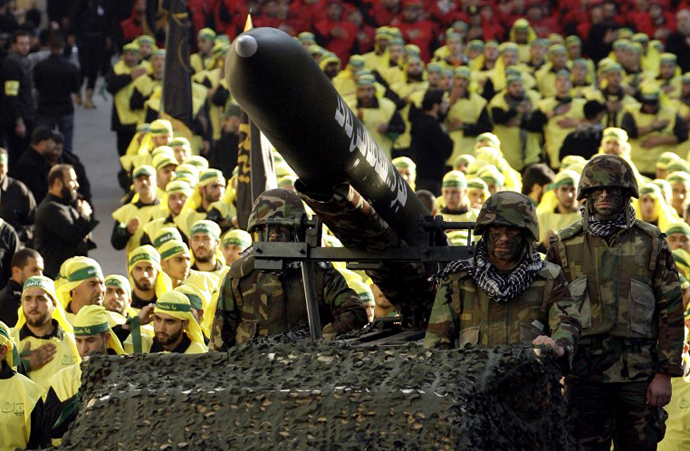The Iranian-sponsored Hizbullah has rotated thousands
of fighters in Syria, a report said.
The Washington Institute for Near East Policy asserted that Hizbullah
was rotating 5,000 fighters to defend the regime of Syrian President Bashar
Assad. In a report, the institute said Hizbullah has lost some 1,000 troops
since the eruption of the Syrian civil war in 2011.
“The group has devoted substantial financial and human resources to the
campaign, including around 5,000 troops continuously stationed in Syria on a
rotating basis,” the report, titled “Hizbullah’s Limited Options After
Israeli Strike,” said.
Author David Schenker said Hizbullah killed “hundreds if not thousands
of Sunnis, rebels and civilians alike.” At the same time, Schenker said,
Hizbullah has been forced to conduct unprecedented recruitment of young
fighters.
“[This could] suggest the organization may be stretched thin,” the
report, dated Jan. 23, said.
The report said Hizbullah has been under pressure since the Jan. 18
attack by Israel on a Hizbullah-Iranian military convoy in the Golan
Heights. But Hizbullah did not want to stage an escalation that could lead
to an all-out war with Israel.
“The pressure to respond is great, but the last thing Hizbullah needs
right now is an escalation with Israel that devolves to war,” the report
said.
The report said Hizbullah committed a series of operational blunders
in the Syrian civil war. Schenker cited the Israel Air Force attack in
January 2015 as well as Hizbullah’s failure to conduct a major strike on
Israeli interests since the assassination of Hizbullah operational chief
Imad Mughniyeh in 2008. During the air force strike, Mughniyeh’s son, Jihad,
was killed.
“The killing in Quneitra of Mughniyeh’s son Jihad only highlights the
group’s impotence on this matter, seemingly increasing the pressure to
respond militarily,” the report said. “The prospect of yet another costly
conflagration — and the problems a two-front war would create — will
presumably dissuade Hizbullah from responding to the Quneitra strike with
direct, large-scale military action.”
The report said Hizbullah could resume attacks on Israeli interests
abroad. Another option was a “limited military operation” from the Golan
Heights.
“Despite the perils for Hizbullah, however, Teheran and Damascus could
press the militia to escalate its response,” the report said
ISIL Targets Lebanese Route
Islamic State of Iraq and Levant has targeted a key route
to Lebanon.
Officials said ISIL has recruited hundreds of fighters to control a key
route from Syria to Lebanon. They said the effort included ISIL assaults on
several Lebanese towns along the Syrian border.
“The terrorists have made a decision to establish a stronghold along the
border,” an official said. “It seems that they have obtained a sufficient
number of fighters and weapons to sustain operations.”
On Jan. 23, ISIL attacked a Lebanese Army base in the Bekaa Valley. ISIL
fighters captured the base and eventually withdrew after a 16-hour battle
that included Lebanese air and ground strikes.
Officials said the attack on the army base in Talet Al Hamra reflected
an escalation in ISIL operations in Lebanon. They said ISIL and its Al Qaida
rival, Nusra Front for the Defense of Levant, have been recruiting Sunnis,
particularly Palestinians, in the campaign to take over parts of Lebanon.
A key ISIL target was believed to be Ras Baalbek, about five kilometers
from Talet Al Hamra. Officials said Ras Baalbek, a Christian community, has
turned into a virtual ghost town in wake of ISIL and Nusra attacks in the
northern Bekaa.
“People have seen what ISIL does to Muslims, let alone Christians, and
left for other parts of Lebanon or abroad,” an official said. “They also see
that the army does not have the forces to guard the town.”
Ras Baalbek is adjacent to two additional ISIL targets.
Officials said ISIL has been trying for more than six months to capture
neighboring Arsal and Al Qaa.
The Iranian-sponsored Hizbullah has been assigned protection of
Ras Baalbek. Over the last year, Hizbullah formed a civil guard called the
Resistance Brigades to monitor those arriving in the town, whose population
dropped from 7,000 to 1,500.
“There is a new death triangle for ISIL that stretches from Arsal to the
Palestinian refugee camp of Ein Hilwe to Roumieh prison and which reaches
Iraq and [the Syrian city of] Raqa,” Lebanese Interior Minister Nouhad
Mashnouq said.









